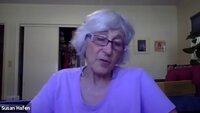| Title |
Hafen, Susan OH3_046 |
| Creator |
Weber State University, Stewart Library: Oral History Program |
| Contributors |
Hafen, Susan interviewee; Harris, Kandice Interviewer & Video Technician |
| Collection Name |
Weber State University Oral Histories |
| Description |
The Weber State University Oral History Project begane conducting interviews with key Weber State University faculty, administrators, staff and students, in Fall 2007. The program focuses primarily on obtaining a historical record of the school along with importand developments since the school gained university status in 1990. The interviews explore the process of achieving university status, as well as major issues including accreditation, diversity, faculty governance, chagnes in leadership, curricular developments, etc. |
| Abstract |
The following is an oral history interview with Dr. Susan Hafen, conducted on June 25, 2021, by Kandice Harris, via video communication platform, Zoom. In this oral history interview, Susan discusses her life, her memories, and her career as a Professor of Communication at Weber State University.; The following is a video clip of an oral history interview with Dr. Susan Hafen. In this video clip, Susan discusses her passion and interest in studying communication. Susan also describes the importance of communication in the workplace and how that influenced her to write about workplace gossip for her dissertation. |
| Subject |
Women in communication; Business communication; Communication teachers; Women in higher education; Social advocacy--United States |
| Keywords |
LGBTQ+ Resources; Webery State University; COVID-19; Professor/Faculty |
| Digital Publisher |
Stewart Library, Weber State University, Ogden, Utah, USA |
| Date |
2021 |
| Date Digital |
2021 |
| Temporal Coverage |
1952; 1953; 1954; 1955; 1956; 1957; 1958; 1959; 1960; 1961; 1962; 1963; 1964; 1965; 1966; 1967; 1968; 1969; 1970; 1971; 1972; 1973; 1974; 1975; 1976; 1977; 1978; 1979; 1980; 1981; 1982; 1983; 1984; 1985; 1986; 1987; 1988; 1989; 1990; 1991; 1992; 1993; 1994; 1995; 1996; 1997; 1998; 1999; 2000; 2001; 2002; 2003; 2004; 2005; 2006; 2007; 2008; 2009; 2010; 2011; 2012; 2013; 2014; 2015; 2016; 2017; 2018; 2019; 2020; 2021 |
| Medium |
oral histories (literary genre) |
| Spatial Coverage |
Saint George, Washington, Utah, United States, https://sws.geonames.org/554620, 37.10415, -113.58412; Las Vegas, Clark, Nevada, United States, https://sws.geonames.org/5506956, 36.17497, -115.13722; Provo, Utah, Utah, United States, https://sws.geonames.org/5780026, 40.23384, -111.65853; Washington, Washington, Washington, D.C., United States, https://sws.geonames.org/4140963, 38.89511, -77.03637; McLean, Fairfax, Virginia, United States, https://sws.geonames.org/4772354, 38.93428, -77.17748; Athens, Athens Township, Athens, Ohio, United States, https://sws.geonames.org/4505542, 39.32924, -82.10126; Ogden, Weber, Utah, United States, https://sws.geonames.org/5779206, 41.223, -111.97383 |
| Type |
Text; Image/StillImage; Image/MovingImage |
| Access Extent |
PDF is 35 pages; Video clip is an mp4 file, 78.5 MB |
| Conversion Specifications |
Interview was recorded using video communication platform, Zoom; Interview was downloaded as an mp4 file; The mp4 file was uploaded to Trint Transcription software (v2021.49.108728) for transcription |
| Language |
eng |
| Rights |
Materials may be used for non-profit and educational purposes, please credit University Archives; Weber State University |
| Source |
Hafen, Susan OH3_046 Weber State University Archives |
| Format |
application/pdf; video/mp4 |
| ARK |
ark:/87278/s6f6dy68 |
| Setname |
wsu_oh |
| ID |
111917 |
| Reference URL |
https://digital.weber.edu/ark:/87278/s6f6dy68 |
| Title |
Hafen, Susan OH3_046 |
| Creator |
Weber State University, Stewart Library: Oral History Program |
| Contributors |
Hafen, Susan interviewee; Harris, Kandice Interviewer & Video Technician |
| Description |
The Weber State University Oral History Project begane conducting interviews with key Weber State University faculty, administrators, staff and students, in Fall 2007. The program focuses primarily on obtaining a historical record of the school along with importand developments since the school gained university status in 1990. The interviews explore the process of achieving university status, as well as major issues including accreditation, diversity, faculty governance, chagnes in leadership, curricular developments, etc. |
| Abstract |
The following is an oral history interview with Dr. Susan Hafen, conducted on June 25, 2021, by Kandice Harris, via video communication platform, Zoom. In this oral history interview, Susan discusses her life, her memories, and her career as a Professor of Communication at Weber State University. |
| Image Captions |
Dr. Susan Hafen Circa 2015 |
| Subject |
Women in communication; Business communication; Communication teachers; Women in higher education; Social advocacy--United States |
| Keywords |
LGBTQ+ Resources; Webery State University; COVID-19; Professor/Faculty |
| Digital Publisher |
Stewart Library, Weber State University, Ogden, Utah, USA |
| Date |
2021 |
| Temporal Coverage |
1952; 1953; 1954; 1955; 1956; 1957; 1958; 1959; 1960; 1961; 1962; 1963; 1964; 1965; 1966; 1967; 1968; 1969; 1970; 1971; 1972; 1973; 1974; 1975; 1976; 1977; 1978; 1979; 1980; 1981; 1982; 1983; 1984; 1985; 1986; 1987; 1988; 1989; 1990; 1991; 1992; 1993; 1994; 1995; 1996; 1997; 1998; 1999; 2000; 2001; 2002; 2003; 2004; 2005; 2006; 2007; 2008; 2009; 2010; 2011; 2012; 2013; 2014; 2015; 2016; 2017; 2018; 2019; 2020; 2021 |
| Medium |
oral histories (literary genre) |
| Spatial Coverage |
Saint George, Washington, Utah, United States, https://sws.geonames.org/554620, 37.10415, -113.58412; Las Vegas, Clark, Nevada, United States, https://sws.geonames.org/5506956, 36.17497, -115.13722; Provo, Utah, Utah, United States, https://sws.geonames.org/5780026, 40.23384, -111.65853; Washington, Washington, Washington, D.C., United States, https://sws.geonames.org/4140963, 38.89511, -77.03637; McLean, Fairfax, Virginia, United States, https://sws.geonames.org/4772354, 38.93428, -77.17748; Athens, Athens Township, Athens, Ohio, United States, https://sws.geonames.org/4505542, 39.32924, -82.10126; Ogden, Weber, Utah, United States, https://sws.geonames.org/5779206, 41.223, -111.97383 |
| Type |
Text; Image/StillImage |
| Access Extent |
PDF is 35 pages |
| Language |
eng |
| Rights |
Materials may be used for non-profit and educational purposes, please credit University Archives; Weber State University |
| Source |
Hafen, Susan OH3_046 Weber State University Archives |
| Format |
application/pdf |
| Setname |
wsu_oh |
| ID |
111956 |
| Reference URL |
https://digital.weber.edu/ark:/87278/s6f6dy68/111956 |





